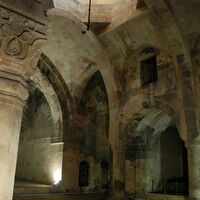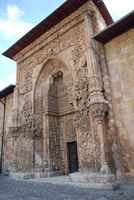Divriği mosque-hospital
Type:
Mosques,
Portals,
Religious complexes
Date:
1228/29
Location or Findspot (Modern-Day Country):
Turkey
Description:
In 1228/29 a mosque-hospital complex was erected at Divriği for two cousins, members of the Mengujekid dynasty, who were vassals of the Sejuqs of Rum. The hypostyle mosque, designed by Khurramshah ibn Mughith from Akhlat, takes up two-thirds of the building; the smaller hospital has a four-iwan plan around an octagonal pool. Both parts have elaborate vaulting and densely carved portals, especially the main, north door into the mosque, which faced the citadel. Such elaborate designs must have been sketched on paper before being transferred to stone. The inclusion of a double-headed eagle, the heraldic emblem of the Seljuqs, acknowledges their overlordship. The profusion of relief sculpture, which includes human faces (on the hospital portal) and birds (on the mosque's west portal) is unusual. The closest parallels are with Armenian architectural sculpture, suggesting that artists moved easily between the Islamicate and Christian realms.
Relevant Textbook Chapter(s):
8
Repository and Online Resources:
• The mosque-hospital at Divriği is a UNESCO World Heritage site.
• Read more about the mosque-hospital, including translations of its Arabic inscriptions, on the Qantara website.
Image Credits:
Wikimedia Commons; Navid Jamali











